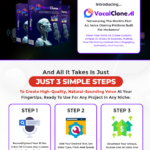Making money online used to be a distant dream, reserved for tech wizards and digital nomads. But times have changed. The internet has leveled the playing field, making it possible for anyone with a computer and an internet connection to turn their passion into a profitable venture.
One of the most accessible and lucrative ways to generate income online is through online courses and trainings. These resources can equip you with the skills and knowledge needed to start and grow a successful online business. Whether you’re looking to supplement your income or quit your day job altogether, online courses can be a game-changer.
My Proven Way to Make $100-$200 Per Day With 0 Investment – Watch THIS FREE Video to START >>

Choose the Right Niche
Selecting the right niche is the cornerstone of a successful online business. It’s akin to building a house on solid ground; a well-chosen niche provides a stable foundation for your venture.
Importance of niche selection:
A well-defined niche offers several advantages:
- Focused audience: You’ll attract a targeted group of individuals who are more likely to be interested in your products or services.
- Reduced competition: A narrower niche often means less competition, making it easier to stand out and acquire customers.
- Higher conversion rates: People who are passionate about a specific topic are more likely to make purchases related to that interest.
- Brand authority: By becoming an expert in a particular niche, you can establish yourself as a trusted authority and build a loyal following.
Factors to consider when choosing a niche:
- Passion and Interest: Building a sustainable online business requires dedication and enthusiasm. Choose a niche that genuinely excites you and aligns with your personal interests.
- Market Demand and Competition: Research the market demand for your chosen niche. Use tools like Google Keyword Planner to assess search volume and competition. A high demand but low competition indicates a promising opportunity.
- Profit Potential: Consider the potential profitability of your niche. Look at the average prices of products or services in your niche, as well as the typical commission rates for affiliate marketing.
Examples of profitable niches:
- Health and wellness: Fitness, nutrition, mental health, and personal development.
- Technology: Gadgets, software, online courses, and digital marketing.
- Finance and investing: Personal finance, stock market, real estate, and cryptocurrency.
- Hobbies and interests: Cooking, gaming, travel, and art.
- Education: Online tutoring, language learning, and professional development.
By carefully considering these factors, you can select a niche that not only aligns with your interests but also offers significant potential for growth and success.
My Proven Way to Make $100-$200 Per Day With 0 Investment – Watch THIS FREE Video to START >>
Build a Strong Online Presence
Your online presence is your digital storefront. It’s where you showcase your expertise, connect with your audience, and ultimately drive sales. A well-crafted website or blog is essential for building a strong online presence.
The role of a website or blog:
- Central hub: Your website serves as the central hub of your online business. It’s where visitors can learn about your products or services, explore your content, and take action.
- Credibility: A professional-looking website establishes credibility and trust with your audience.
- SEO benefits: A well-optimized website can improve your search engine rankings, making it easier for potential customers to find you.
- Lead generation: Your website can be a powerful tool for generating leads and driving sales.
Content creation strategies:
- Keyword research and optimization: Identify relevant keywords that your target audience is searching for. Incorporate these keywords naturally into your content to improve your search engine rankings.
- High-quality, informative content: Create valuable, engaging content that provides solutions to your audience’s problems or addresses their needs. This could include blog posts, articles, videos, or podcasts.
- Regular updates: Keep your website fresh and relevant by publishing new content regularly. This will help you maintain your audience’s interest and improve your search engine rankings.
Leveraging social media platforms:
- Audience engagement: Social media platforms offer a great way to connect with your audience, build relationships, and foster community.
- Content promotion: Share your website content on social media to increase visibility and reach a wider audience.
- Paid advertising: Consider using paid social media advertising to target specific demographics and drive traffic to your website.
- Customer support: Use social media to provide excellent customer service and address any questions or concerns.
By implementing these strategies, you can create a strong online presence that attracts visitors, builds trust, and drives conversions.
Promote Your Affiliate Links Strategically
Once you’ve created high-quality content and built a strong online presence, it’s time to promote your affiliate links effectively. This requires a strategic approach that balances promotion with authenticity.
Ethical and effective promotion techniques:
- Transparency: Always disclose your affiliate relationships to your audience. Be honest and upfront about the fact that you may earn a commission from purchases made through your links.
- Value-driven recommendations: Focus on recommending products or services that genuinely benefit your audience. Avoid promoting products solely for the commission.
- Avoid spammy tactics: Don’t spam your audience with affiliate links. Instead, integrate them naturally into your content and conversations.
Using natural product recommendations:
- Personal experiences: Share your personal experiences with products or services to make your recommendations more authentic.
- Expert opinions: Cite expert reviews or testimonials to support your recommendations.
- Comparative analysis: Compare and contrast different products or services to help your audience make informed decisions.
Building relationships with your audience:
- Engaging content: Create content that resonates with your audience and fosters a sense of community.
- Active engagement: Respond to comments, messages, and questions from your audience.
- Personalized interactions: Show that you care about your audience by offering personalized recommendations and advice.
Leveraging email marketing:
- Nurturing relationships: Use email marketing to stay in touch with your audience and build relationships.
- Promoting affiliate links: Send targeted email campaigns promoting relevant products or services.
- Building trust: Offer valuable content and exclusive offers to your email subscribers.
By following these guidelines, you can promote your affiliate links ethically and effectively, while building trust and loyalty with your audience.
My Proven Way to Make $100-$200 Per Day With 0 Investment – Watch THIS FREE Video to START >>
Track and Optimize Your Performance
To measure the success of your affiliate marketing efforts and make data-driven decisions, it’s crucial to track and analyze key performance indicators (KPIs).
Importance of tracking affiliate marketing metrics:
- Identifying trends: Tracking metrics helps you identify trends, such as which products or services are performing well and which ones need improvement.
- Optimizing campaigns: By analyzing your data, you can make informed decisions to optimize your campaigns and increase your earnings.
- Measuring ROI: Tracking metrics allows you to measure your return on investment (ROI) and determine the effectiveness of your affiliate marketing efforts.
Key metrics to monitor:
- Click-through rate (CTR): This metric measures the percentage of people who click on your affiliate links. A high CTR indicates that your content and calls to action are engaging.
- Conversion rate: This metric measures the percentage of clicks that result in a purchase or other desired action. A high conversion rate means your audience is more likely to convert into customers.
- Earnings per click (EPC): This metric measures the average amount you earn for each click on your affiliate links. A high EPC indicates that you’re promoting high-value products or services.
Using analytics tools to optimize your campaigns:
- Google Analytics: This powerful tool can provide valuable insights into your website traffic, user behavior, and conversions.
- Affiliate network tracking: Most affiliate networks offer tracking tools that allow you to monitor your performance and identify top-performing affiliates.
- Custom dashboards: Consider creating custom dashboards to visualize your key metrics and track progress over time.
By tracking and analyzing these metrics, you can gain a deeper understanding of your affiliate marketing performance and make data-driven decisions to optimize your campaigns for maximum profitability.
Stay Updated with Industry Trends
The affiliate marketing landscape is constantly evolving, with new trends and technologies emerging regularly. To remain competitive and successful, it’s essential to stay informed about industry news and trends.
The ever-evolving nature of affiliate marketing:
- New platforms: New social media platforms, content creation tools, and marketing channels are continually emerging.
- Technological advancements: Advances in technology, such as artificial intelligence and automation, are changing the way affiliate marketing is done.
- Consumer behavior shifts: Consumer preferences and behaviors are constantly evolving, impacting the effectiveness of affiliate marketing strategies.
Staying informed about industry news and trends:
- Industry publications: Follow industry publications, blogs, and newsletters to stay updated on the latest trends and best practices.
- Social media: Join relevant industry groups and follow thought leaders on social media.
- Webinars and conferences: Attend webinars and conferences to learn about new strategies and network with other professionals.
Adapting your strategies to new opportunities:
- Experimentation: Be willing to experiment with new strategies and technologies to stay ahead of the curve.
- Continuous learning: Invest in your professional development by taking online courses or attending workshops.
- Flexibility: Be adaptable and willing to adjust your strategies as needed to respond to changing market conditions.
By staying informed about industry trends and adapting your strategies accordingly, you can ensure that your affiliate marketing efforts remain relevant and effective in the long run.
My Proven Way to Make $100-$200 Per Day With 0 Investment – Watch THIS FREE Video to START >>
Conclusion
In conclusion, affiliate marketing offers a lucrative opportunity for individuals to generate income online. By choosing the right niche, building a strong online presence, promoting affiliate links strategically, tracking and optimizing performance, and staying updated with industry trends, you can achieve success in this field.
Remember, affiliate marketing requires dedication, patience, and a willingness to learn and adapt. By following the strategies outlined in this guide, you can increase your chances of building a profitable and sustainable online business.









